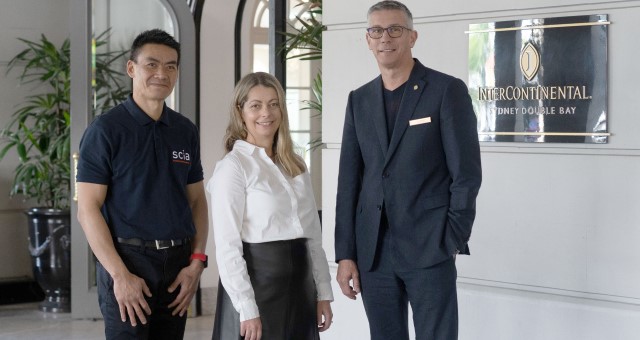IHG Hotels and Resorts is doubling down on efforts to make a career in hotels more accessible for people with disability through a new strategic partnership with Spinal Cord Injuries Australia (SCIA) employment service, EmployAbility.
The partnership supports the employment of people with a physical disability across a wide variety of positions at IHG hotels around the country, not just desk-based roles.
IHG’s Head of Human Resource Operations – Australasia and Japan, Lynda Ugarte, told HM that there should be no biases creating barriers to employment for people with a disability.
“All roles are potentially available for people with accessibility issues,” she said.
“Until we know the individual, until we actually talk with them, we don’t know what job they could be suited to – so we’re not containing this to just a few roles.”
InterContinental Sydney Double Bay General Manager, Ralf Bruegger, said there are plenty of job opportunities out there for people with a disability.
“Let’s not stereotype and make things more complicated than they need to be,” he said.
“I’m proud to be part of the change in providing better opportunities for people with disability and I hope that this encourages other organisations to do the same.”
IHG has been in discussions with SCIA for around 18 months following an introduction by mutual connection Kerry Williams, Founder of travel consultancy The Accessible Group, who is very active in sourcing and advocating for accessible accommodation and tourism options for people with disability.
A pilot program is already underway at a number of IHG properties including InterContinental Sydney Double Bay, Crowne Plaza Darling Harbour and Crowne Plaza Hunter Valley.
Accessibility on all fronts
Through this partnership, EmployAbility is informed when new positions become available across the IHG network and can then put forward any candidates for interview that match the skills and experience required for a given role.
When a candidate is successful, EmployAbility works with that specific hotel team to ensure that all of the person’s accessibility needs are met and understood.
“SCIA visits the hotels to review the work environments across different roles and advise the hotels of amendments they might need to make to broaden accessibility,” Ugarte explained.
“And it’s not just the basics like ramps and wide doors, it’s the font that we have available, voice recognition etc. The hotels have really learned from that and have made amendments.”
Beyond the physical accessibility requirements, hotel teams are also briefed on ways that they can create a supportive environment for their colleagues with physical disability.
“We’re really trying to build a culture of normalcy for a people with a range of abilities,” Ugarte added.
“We want to make sure that this program has got real integrity.”
Diverse talent pool
As well as being a major step forward for accessibility within the business and the industry, Ugarte said the partnership is an opportunity to connect with new candidate pools and welcome untapped talent to the business.
“It’s going to open up more talent pools for us,” she said.
“Spinal cord injuries can happen to anyone. There are some people who are very experienced in their careers but can’t continue to work following a spinal cord injury and yet they’ve got such transferable skills.”
EmployAbility manager, Phat Ngo, said many people with a spinal cord injury are held back from pursuing new roles by a fear of rejection.
“Many people with physical disability, particularly those who have had to reassess their employment choices after an accident or injury, often choose not to apply to roles due to concerns the employer would deem them unable to perform due to their disability,” he said.
He said EmployAbility’s work is about providing career opportunities for people with disability, ‘not just a job’.

